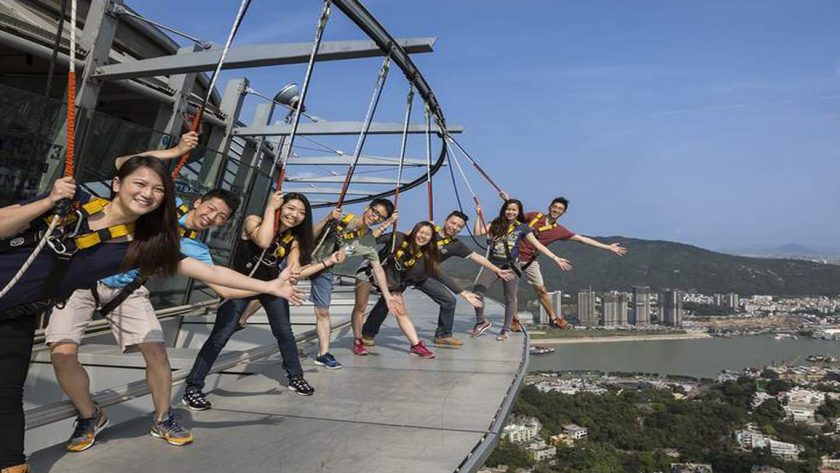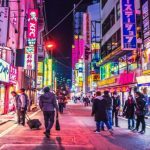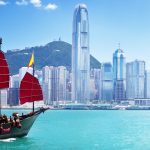Hong Kong’s colonial sister-in-law lies just around the corner from Victoria Island, though like Hong Kong, the European’s lease is almost up. Officially founded as a colony by Portugal in 1557, Macau was the destination of round the Horn pioneering navigators sailing to the end of the world, or until they hit land. They sought their fortunes in the spice trade with the East Indies and the New World silver trade with Japan. Though Macau’s streets aren’t lined in silver, the Portuguese were glad to stay. Today, Macau is a smooth one-hour hydrofoil ride away for Hong Kong Chinese seeking their fortunes at the city’s roulette tables. The casinos, many of which are triad-run, produce enough tax income to cover more than a third of Macau’s operating expenses. Palms are crossed with silver, quite literally. It also serves as an entry point to mainland China and that proximity is as important to its future as its past.
When I took a hydrofoil past the lush cliffs of Hong Kong to Macau, I expected to find a luxurious Las Vegas a la Asia with a colonial European outpost down the street. Macau is neither. It’s a unique island, a combination of its heritage, geography, and nine square miles of gambling. Like any dice mecca, it’s accompanied by the vices that follow hard-core gambling: prostitutes and gangsters.
Although Macau is a Portuguese colony until December 20, 1999 when China resumes sovereignty over Macau, 95% of its 450,000 inhabitants are Chinese. Only about 7,000 speak Portuguese, although it’s the official language of the Portuguese colony. Macau’s relations with China have been different than those of their former British neighbor. Unlike Hong Kong, Macau was never ceded to Portugal. Portugal’s presence began as a lease on land. Portugal never exerted the same magnitude of power in Asia as Britain did through Hong Kong. In fact, since Portugal’s democratic revolution in 1974, Macau has been administered by Portuguese but for all practical purposes controlled by China. Unlike rather segregated Hong Kong, Macau is a famously tolerant community where Western and Eastern cultures have blended. This tolerance may have led to its place today in the Pleasure Hall of Fame (or Hall of Shame, as some would insist). Opium dealing was legal until 1947 and gambling was legalized a century-and-a-half ago. Integral to Macau’s economy, gambling will remain legal for the near future.
This tolerance has also led to blending in two important cultural elements: religion and cuisine. The Portuguese were interested in converting China to Catholicism from their base in Macau. The facade of the church of St. Paul is perhaps the most extraordinary monument to Christianity in Asia. The immigration hall at the border to China is decorated in blue and white azulejos tiles like I have seen covering the walls of Portuguese cathedrals. Macanese cuisine is also a combination of Cantonese styles and flavors and Portuguese dishes. Also unlike Hong Kong’s change to Chinese control, Macau’s citizens in residence since 1981 have been offered full Portuguese citizenship. With such citizenship they are allowed to live, work or travel anywhere in Europe.
Macau depends on China for much of its food and labor so it has been an agreeable neighbor. Mainland Chinese money has funded much of the land reclamation effort that has eliminated the colonial waterfront in favor of 50% greater acreage for the island. Over the years China has exerted a continually increasing presence in Macau. To catch the last remnant of Portugal’s fading role in Asia, pretend you’re an explorer and hop onto one of the hydrofoils out of Hong Kong with some silver in your pocket and your lucky dice.
Macau, a former Portuguese colony located in the southern part of China, is a popular destination for tourists, including students who want to explore the unique blend of Chinese and Portuguese cultures. If you are planning a student travel to Macau from Hong Kong, here are some tips on how to get there.
- Take the Ferry
The easiest and most popular way to get to Macau from Hong Kong is by ferry. There are two ferry terminals in Hong Kong that offer regular ferry services to Macau: the Hong Kong-Macau Ferry Terminal in Sheung Wan and the China Ferry Terminal in Tsim Sha Tsui. Both terminals are easily accessible by public transport, including the MTR (Mass Transit Railway) and buses.
There are several ferry operators that offer services to Macau, including TurboJET, Cotai Water Jet, and Macau Ferry. The journey takes around one hour, and there are frequent departures throughout the day. It is recommended to book your tickets in advance, especially during peak travel periods.
- Take a Helicopter
For a more unique and luxurious travel experience, you can also take a helicopter from Hong Kong to Macau. Sky Shuttle Helicopters operates regular services between Hong Kong and Macau, with flights departing from the Hong Kong-Macau Ferry Terminal and the Shun Tak Heliport in Central. The journey takes only 15 minutes and offers stunning views of the Hong Kong and Macau skylines.
However, taking a helicopter is considerably more expensive than taking the ferry. It is also subject to weather conditions, so it is recommended to check the weather forecast before booking your tickets.
- Take the Bus
Another option to get to Macau from Hong Kong is by bus. There are several bus companies that operate services between the two destinations, including Transmac, TurboJET, and Citybus. The journey takes around three hours and offers a more affordable alternative to the ferry or helicopter.
The buses depart from several locations in Hong Kong, including the airport, the China Ferry Terminal, and the Hong Kong-Macau Ferry Terminal. It is recommended to book your tickets in advance, especially during peak travel periods.
- Take the Train
Currently, there is no direct train service between Hong Kong and Macau. However, a high-speed rail link is currently under construction and is expected to be completed in the near future. The rail link will connect Hong Kong to several cities in mainland China, including Guangzhou, Shenzhen, and eventually Macau.
Once completed, the rail link will offer a faster and more convenient way to travel between Hong Kong and Macau. It is expected to take around 40 minutes to travel from Hong Kong to Macau by train.
In conclusion, there are several ways to get to Macau from Hong Kong, including by ferry, helicopter, bus, and in the future, by train. Each option offers its own advantages and disadvantages, so it is important to consider your budget, travel time, and personal preferences when choosing the best way to travel. Regardless of which option you choose, a student travel to Macau from Hong Kong is a unique and unforgettable experience that is definitely worth the trip.



